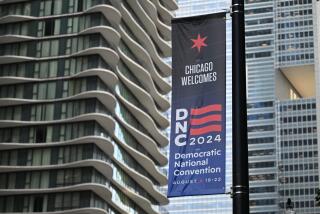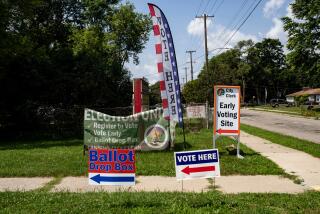If Illinois Plays the Pivotal Primary Role, Its Fickle Voters Haven’t Heard the Hype : Campaign: President wanna-bes get an underwhelming response. Almost anything could happen on St. Patrick’s Day, pundits say.
- Share via
CHICAGO — It was delectably balmy here earlier this week, with temperatures nudging into the 70s, crocuses and tulips peaking above the soil and even a smattering of sun worshipers on the beach flouting that ozone hole.
And then, in a span of about two hours, the false spring vanished. The wind they call the Hawk roared in; the thermometer plunged faster than George Bush’s approval rating; lightning, thunder and hail burst forth, giving way to a nasty coating of freezing rain followed by a healthy blanket of snow.
There are lessons in the weather for the gaggle of presidential wanna-bes descending on Illinois this week. For one thing, pack for any eventuality, short sleeves as well as woollies. For another, prepare to tackle a political climate that can be as fickle and varied as anything Mother Nature can dish out.
Indeed, the Prairie State is a pundit’s paradise. The electorate is so diverse in this large Midwestern state that prognosticators and pollsters can have a field day handicapping next Tuesday’s primary.
“One or two constituencies do not dominate the political landscape,” boasts state Democratic Chairman Gary LaPaille. “Illinois is the heartland and the quintessential microcosm of the United States.”
With its population of 11.4 million, the state is rich in white ethnics, minorities, managerial types, academics, union members and welfare recipients. There’s failing industry, successful industry, agriculture galore and even a Southern-style “Bubba” vote to be courted in the bottom edge of the state, which has always had more akin to dewy Dixie than the Rust Belt.
As such, just about any evidence can be found to justify any projection and turn it on its head. To wit:
--Bill Clinton can expect to do well among the numerous black voters in the Chicago area. But then again, Clinton is no hometown hero like the Rev. Jesse Jackson was four years ago, so how many blacks will turn out for the Arkansas governor is anyone’s guess.
--Paul E. Tsongas has the franchise on the “yuppie” vote and, as in other states, should attract strong support from Roman Catholics, who have qualms about Clinton, polls have shown. But the legions of stockbrokers and hog belly traders take their BMWs and Acuras out to Chicago’s Republican suburbs when the closing bells sound, so they may not be voting in the race Tsongas is running. And the state’s many Catholics are also blue-collar workers, and their union brethren elsewhere have been less than crazy about the former Massachusetts senator.
--The state ought to be a lock for President Bush, who has the entire local Republican hierarchy out stumping for him, as well as a trio of Cabinet members and White House Chief of Staff Samuel K. Skinner, all former Illinois residents. Then again, the statewide unemployment rate topped 9% not too long ago. Still, farm exports have been pretty good and the housing and retailing markets have stayed relatively stable. But then again . . . .
About the only thing that can be said with any certitude is that the response to the campaign to date has been underwhelming. Chicago--the City of Big Shoulders--and the state as a whole by and large have given a big shrug to the media hype about the state’s pivotal stature.
“I don’t hear many people talking about” the presidential campaigns, said University of Illinois political scientist Michael McBurnett. “Nobody has come around in our neighborhood trying to register people. I just haven’t seen all that much activity.”
Catherine Speed, one of those black voters Clinton will be counting on, declared herself “bored stiff” with the ballot choices she faces. She will vote, the 57-year-old Speed said as she browsed through a Chicago shopping center the other day, but she probably will not make up her mind until the last minute.
“It doesn’t touch you, what they are saying,” she complained of the candidates. “Conservative or liberal, what do they mean? It doesn’t mean a hill of beans to the voter.”
Weekend polls published by the two major Chicago newspapers showed Bush with a commanding lead over GOP challenger Patrick J. Buchanan. On the Democratic side, Clinton had a slim margin over Tsongas. That’s clearly a plus for Tsongas, who barely registered in local voter surveys not too long ago and who has hardly campaigned in Illinois up to now.
Former California Gov. Edmund G. (Jerry) Brown Jr. notched all of 3% in the 1980 Illinois presidential primary, and there are few signs that he will do significantly better this time around. Illinoisans, especially Chicagoans inured to the customs of machine politics, tend to be a cynical lot. When it comes to picking public officials, they are generally more comfortable with the pinkie-ringed sort than the touchy-feely variety. After all, Brown’s “Gov. Moonbeam” moniker was the invention of Chicago newspaper columnist Mike Royko (although Royko has since disavowed the label as unfair).
Illinois is an open primary state, meaning voters can cast ballots in the contest of their choice, regardless of their affiliation. In the Democratic race, that could be a boon to Tsongas because his pro-business message might be soothing to the ears of moderate Republicans disenchanted with Bush. And since moderates dominate the Illinois GOP, such a crossover can be expected to diminish Bush’s margin over Buchanan.
There are not many riveting local contests, but those that have stirred interest have the potential to draw a large minority turnout, which in turn could aid Clinton. One has been marked by the anti-Semitic tactics of Rep. Gus Savage, a Democratic black incumbent trying to fend off a strong challenge by tabbing his opponent, a black college professor, as a tool of Jewish money men and Israeli interests.
Another involves a somewhat esoteric ballot question in Chicago. Voters must choose between competing boundary plans for redesigned City Council wards, one favoring black politicians and the other favoring whites.
Statewide, there is a heated primary challenge to the reelection bid of Democratic Sen. Alan J. Dixon by two opponents--Carol Moseley Braun, a Cook County official who is black, and Albert Hofeld, a personal injury lawyer who has spent more than $4 million of his own money on his campaign.
Looming over all the contests, of course, is the elusive leprechaun factor. In a city long dominated by Irish politicians, one of the most important days on the calendar is St. Patrick’s Day. Typically, Chicago hosts a huge parade in the downtown Loop where attendance is virtually mandatory for government workers and Democratic political operatives, regardless of their ethnic origin. Most then take the rest of the day off, and many head to the nearest Irish pub.
This year, however, the primary falls on St. Patrick’s Day. Chicago’s parade has been moved up to Saturday, freeing political types to work the precincts on Tuesday, but ruining a time-honored excuse to nip away on a workday.
The police contingent normally assigned to guard the city’s 2,912 polling places has been slashed, in part because the bars will be open for St. Patrick’s Day festivities and extra patrols could be needed there.
Jim Murphy, the proprietor of Murphy’s Bar near Wrigley Field, said poll judges have already called him to make sure he will keep a supply of warmed corn beef on hand until after the polls close.
Despite the inconvenience to potential revelers, Murphy said the confluence of events next Tuesday actually could liven up the presidential contest. “It adds more spirit,” he said. “Some (people) will be drowning their sorrows and others will be celebrating their success. It’s kind of like watching the Cubs.”
Researcher Tracy Shryer contributed to this story.
More to Read
Get the L.A. Times Politics newsletter
Deeply reported insights into legislation, politics and policy from Sacramento, Washington and beyond. In your inbox twice per week.
You may occasionally receive promotional content from the Los Angeles Times.










